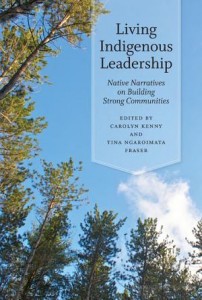 Living Indigenous Leadership: Native Narratives on Building Strong Communities: Edited by Carolyn Kenny and Tina Ngaroimata Fraser.
Living Indigenous Leadership: Native Narratives on Building Strong Communities: Edited by Carolyn Kenny and Tina Ngaroimata Fraser.
Julia Buchanan

Julia Buchanan
While pursuing my doctorate, I met a student in a leadership graduate program who was told his understanding of leadership was “incorrect.” When I probed further, I learned that according to him and the teachings of his Indigenous nation, leadership is understood as collective and decentralized—that leadership was an earned recognition through people knowing you and your character. He talked about how leadership involves a connection to place, cultural practices and a relationship to the land. Following this experience, and many others, I grew more and more intrigued about an Indigenous world view and how leadership is understood, developed and practiced. In the book Living Indigenous Leadership: Native Narratives on Building Strong Communities, edited by Carolyn Kenny and Tina Ngaroimata Fraser are articles written by Native scholars many of whom have completed research with Indigenous communities. The type of research included here is humanistic and often filled with personal narrative that draws you into their experiences. The chapters offer a variety of perspectives and begin to provide answers to some ongoing questions such as: (a) how is leadership understood from a Native world view? (b) What can be learned about how to build strong and resilient communities?
This comprehensive work written by Indigenous scholars originated as an idea emerging from the International Leadership Association conference in Vancouver following a presentation that brought Native authors together. The book includes sections on Leadership Native Style, Collaboration is Key and Healing and Perseverance work. Throughout the text a number of concepts surface which are thought provoking and give the reader a sense of the concepts that inform Native leadership such as the need for respectful relationships, the necessity to be experts in two worlds, and an awareness of decolonization especially for educational institutions. The book is an excellent example of the strengths of narrative to inform and educate especially for understanding world views and lived experiences.
The first chapter by Carolyn Kenny offers an overview of leadership that provides a framework for understanding the ideas in the book. She states, “The stories of Native leadership presented in this volume are free from dominating theories. They are grounded in experience and represent specific contexts, particular tribes, diverse lands, inherent values and beliefs, a variety of protocols, a plethora of languages, and a tremendous variety of circumstances” (2012, p. 2). She also effectively creates context to understand the leadership theory that flows beneath the narrative throughout the text.
Yvonne McLeod shares in another chapter, a study of eight inter-generational leaders (Learning to Lead Kokum Style), her insights and her challenges of dual leadership identity and presents a framework in the four directions that reminds me of an integral whole (p.20). Through the narrative she shares heartfelt reflection and wisdom for someone who has had to become an expert in two very different worlds in order to lead effectively. In another chapter, Tina Ngaroimata Fraser speaks about stories of identity development, of lessons learned at “the hem of my grandmothers’ black skirts” (p.120). It’s easy to visualize this: “Eventually, she [grandmother] was arrested and taken away. She raised her skirt to the men of the tribe to indicate to them that they were cowards for not attempting to stop the surveyors.” (p. 121).
Healing, decolonization and transformation are themes that run throughout much of the book with stories of sacrifice and collaboration from leaders in Indigenous Nations in North America, Canada and New Zealand. Including a chapter from a third generation social justice leader and activist, Raquel Gutierrez who mentions her generational inheritance,
These gifts include an eagle eye, the ability to move from a micro to a macro perspective with ease; seventh generation thinking, a multi-generational framework for making decisions; and a Pachamama heart, the know-how to consider the physical and metaphorical ecosystem when making choices and determining action. (p. 97)
The rich descriptions and human stories illustrate the difficulty that many Native scholars have living in two worlds, resistance from each one at times, and a journey to find answers for issues impacting their communities.
The third section includes Healing and Perseverance. An article by Michelle Jacob illustrates how micro-aggressions and a lack of awareness can harm students and professors interacting with Native populations. Jacobs states, “Struggles between universities and Native communities are ultimately about offering Native People access to institutions that are places of healing not sites that perpetuate historical trauma” (p.189). She skillfully calls those of us in academia to engage in reflection, increase awareness and though some of the comments in her article troubled me, because she made me think, I immediately wanted to thank her for it!
For anyone that uses qualitative research or methodology, this book includes examples of how to do it well. Each article through its unique voice and design opens your eyes to the lived experience of these authors in ways that are at times heart breaking but also joyful and invite you into leadership that is Indigenous and integral. Cheney (2012) shares this,
The researcher in me strives to understand the framework that contains both worldviews in one house. The amalgamation of colonization, assimilation, acculturation and, finally, self determination together form that house. Yet this house can hold ceremony, community, the earth, and individualism in harmony for the future. (p. 151)
This book is an excellent resource for those looking to understand a world view that is Indigenous, to understand leadership that is transformational, including decolonization and involving social justice.
I conclude this writing by telling you that I am a non-Native academic that is offering a review of a book written by Indigenous authors. I was asked to review the book because I had done my dissertation in collaboration with Native scholars, most of whom are members of the Cree Nation and many who work at Blue Quills First Nations College. Through that experience, and many more, I have friendships that are ongoing and in the spirit of relational accountability, I offer this review. I begin this way because awareness is growing that non-Indigenous authors should be thoughtful, and respectful in talking about work done by Native scholars. For more on decolonization and ethics in research see Denzin and Giardina, 2007; Regan, 2005; Smith, 1999; Wilson, 2008.
References
Denzin, N. K. and Giardina, M.D.(2007). Ethical Futures in Qualitative Research: Decolonizing the Politics of Knowledge. Walnut Creek, CA: Left Coast Press
Kenny, Carolyn. & Fraser, Tina Ngaroimata (2012). Living Indigenous Leadership: Native Narratives on Building Strong Communities. Vancouver, BC: UBC Press.
Regan, P. (2005, January 20th). A Transformative Framework for Decolonizing Canada: A Non-Indigenous Approach. IGOV Doctoral Student Symposium.
Smith, Linda Tuhiwai (1999). Decolonizing methodologies: research and indigenous peoples. London, England: University of Otago Press.
Wilson, S. (2008). Research is Ceremony: Indigenous Research Methods. Black Point, Nova Scotia: Fernwood Publishing.
About the Author
Julia L. Buchanan, PhD, is currently Lead Faculty for the master’s degree in Leadership for National University in La Jolla, Ca. She completed her PhD in Leadership Studies at the University of San Diego examining Indigenous views of leadership in collaboration with Cree (First Nations) leaders. As an accomplished former executive director and program director, she specializes in applied leadership development through all levels of the organization. Currently Dr. Buchanan teaches graduate courses in leadership, group dynamics, ethics and research. Her research interests include Indigenous leadership, group relations and authority dynamics, and experiential methodologies for learning leadership.
Contact information: jbuchanan@nu.edu, 619.563.7289
